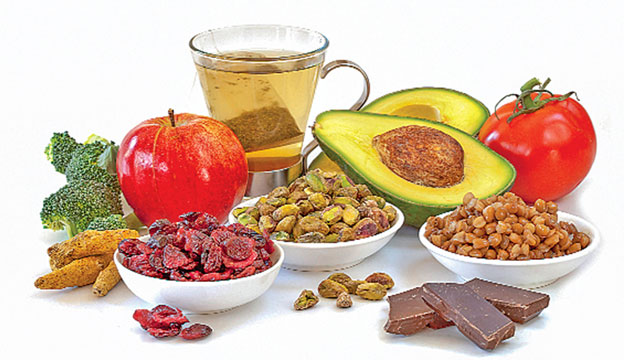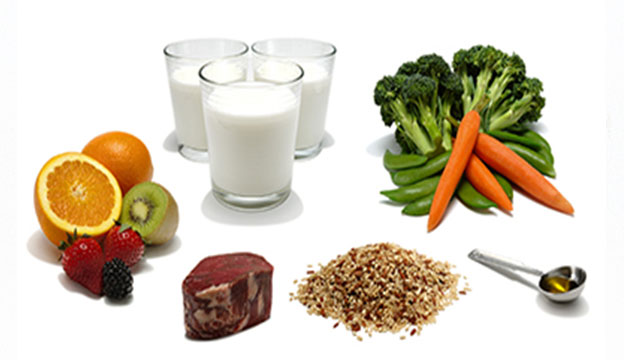10 Benefits of Fasting That Will Surprise You
1. Fasting Helps Weight Loss
Fasting can be a safe way to lose weight as many studies have shown that intermittent fasting � fasting that is controlled within a set number of hours � allows the body to burn through fat cells more effectively than just regular dieting.
Intermittent fasting allows the body to use fat as its primary source of energy instead of sugar. Many athletes now use fasting as means to hitting low body fat percentages for competitions.
2. Fasting Improves Insulin Sensitivity
Fasting has shown to have a positive effect on insulin sensitivity, allowing you to tolerate carbohydrates (sugar) better than if you didn�t fast. A study showed that after periods of fasting, insulin becomes more effective in telling cells to take up glucose from blood.
3. Fasting Speeds Up The Metabolism
Intermittent fasting gives your digestive system a rest, and this can energise your metabolism to burn through calories more efficiently. If your digestion is poor, this can effect your ability to metabolise food and burn fat. Intermittent fasts can regulate your digestion and promote healthy bowel function, thus improving your metabolic function.
4. Fasting Promotes Longevity
Believe it or not, the less you eat the longer you will live. Studies have shown how the lifespan of people in certain cultures increased due to their diets. However, we don�t need to live amongst a foreign community to reap the benefits of fasting. One of the primary effects of ageing is a slower metabolism, the younger your body is, the faster and more efficient your metabolism. The less you eat, the less toll it takes on your digestive system.
5. Fasting Improves Hunger
Just think about this, can you actually experience real hunger if you eat a meal every 3-4 hours? Of course you can�t. In fact, to experience the true nature of hunger, this would take anything from 12 to even 24 hours.
Fasting helps to regulate the hormones in your body so that you experience what true hunger is. We know that obese individuals do not receive the correct signals to let them know they are full due excessive eating patterns.
Think of fasting as a reset button: the longer you fast, the more your body can regulate itself to release the correct hormones, so that you can experience what real hunger is. Not to mention, when your hormones are working correctly, you get full quicker.
6. Fasting Improves Your Eating Patterns
Fasting can be a helpful practice for those who suffer with binge eating disorders, and for those who find it difficult to establish a correct eating pattern due to work and other priorities.
With intermittent fasting going all afternoon without a meal is okay and it can allow you to eat at a set time that fits your lifestyle. Also, for anyone who wants to prevent binge eating, you can establish a set time in where you allow yourself to eat your daily amount of calories in one sitting, and then not eat till the following day.
7. Fasting Improves Your Brain Function
Fasting has shown to improve brain function, because it boosts the production of a protein called brain-derived neurotrophic factor (BDNF.) BDNF activates brain stem cells to convert into new neurons, and triggers numerous other chemicals that promote neural health. This protein also protects your brain cells from changes associated with Alzheimer�s and Parkinson�s disease.
8. Fasting Improves Your Immune System
Intermittent fasting improves the immune system because it reduces free radical damage, regulates inflammatory conditions in the body and starves off cancer cell formation.
In nature, when animals get sick they stop eating and instead focus on resting. This is a primal instinct to reduce stress on their internal system so their body can fight off infection. We humans are the only species who look for food when we are ill, even when we do not need it.
9. Fasting Contributes To Self-Enlightenment
Fasting has helped many people feel more connected to life during the practices reading, meditation, yoga and martial arts etc. With no food in the digestive system, this makes room for more energy in the body � the digestive is one of the most energy absorbing systems in the body.
Fasting for self-enlightenment, allows us to feel better both consciously and physically. With a lighter body and a clearer mind we become more aware and grateful for the things around us.
10. Fasting Helps Clear The Skin And Prevent Acne
Fasting can help clear the skin because with the body temporarily freed from digestion, it�s able to focus its regenerative energies on other systems.
Not eating anything for just one day has shown to help the body clean up the toxins and regulate the functioning of other organs of the body like liver, kidneys and other parts.

7 tips to keep you healthy while fasting during Ramadan
Including foods to stock up on and ones to avoid.
Fasting during the Holy Month can get difficult, especially during the peak of summer. Follow these tips to ensure you have a healthy Ramadan and avoid health problems.
1. Don�t skip meals
Avoid skipping meals, especially Suhoor. Eating slow carbs as you wake up will give you lasting energy throughout the day. If you don�t have a large appetite early in the morning, a glass of milk, a few nuts and dates are recommended. For those who eat heavier meals in the morning, wheat kaboos with hummus or chicken is ideal.
Remember to drink at least two to three glasses of water before you begin fasting to avoid feeling dehydrated during the fasting hours.
2. Go slow when you break your fast
Coconut-coated dates with laban, avocado juice with fruits or dried fruit or soups are the perfect choice of foods to opt for when you break your fast. A good mix of carbs, proteins, fruits and vegetables should be included in your meals.
3. Load up on B complex vitamins
Having a B complex vitamin like neurobion at Suhoor has shown to keep energy levels up during the fasting period.
4. Foods to be avoided
Fasting can often increase gastric acidity levels in the stomach, causing a burning feeling and heaviness in the stomach. This experience can be avoided by eating foods rich in fibre. It�s also important to avoid fried foods, very spicy foods, salty foods and foods containing too much sugar. Sweets can cause health problems like indigestion, heartburn, and weight problems and should not be part of your diet, especially on an empty stomach.
Too much salty food make your body retain water and give you the feeling of being bloated, while spicy foods also induce thirst. Sweets and sugary foods are fast burning and will only last for three to four hours. Incidentally these will turn into fat, increase cholesterol levels and make you gain weight.
5. What to drink
Drinks with high caffeine content (coffee, tea, chocolate, sodas and even decaffeinated teas and coffees) should be avoided. Caffeine percolates calcium from your system, which makes you feel less full all the time. Avoid drinking tea at Suhoor, as tea increases salt excretion in the urine, which is needed for your body during fasting. The ideal beverage would be water, or if you�re feeling more dehydrated than usual, try adding a slice of lime, strawberries or even mint to your glass of water.
6. Work out (mildly)
Light physical activity is also recommended and will keep your body supple and fit. During the summer, your body can also mistake the lack of water for hunger, and could cause you to ingest more than your body can handle. Ensure to drink plenty of water when breaking your fast.
7. Self-Discipline
As Ramadan fasting is basically an exercise in self-discipline, for those who are chain smokers, food nibblers or caffeine addicts etc, it is a good opportunity to break the habit, hoping that the effect will continue when the month is over. Ramadan is the time to practice self-restraint, a time to cleanse the body from impurities and re-focus on one�s self. Let this Ramadan bring about the changes that will last a lifetime for you.
Be safe and healthy this season � Ramadan Kareem!

Tips for those fasting in the summer heat
- Dehydration, which results from the loss of a large amount of water from the body, brings about a range of negative health effects � muscle cramps, fatigue, lightheadedness, dry mouth and nausea as well a lack of sweat among them.
- In mild cases dehydration can be uncomfortable, in severe ones it can be life threatening.
- By following proper diet and taking precautionary steps during Ramadan one can avoid the dangers of dehydration.
- Choose the right foods and drink the right amount of water during the month�s iftar and suhour meals.
- Between sunset and sunrise fasters are advised to drink a large amount of water, around 1.5 to 2 liters, but do it slowly so as not to feel sick.
- If you don�t like drinking plain water, add some lemon or rose water to it
- Avoid carbonated and sugary beverages, such as soda and juice, as well as drinks that cause water loss like coffee and tea.
- Drinking a lot of coffee early in the morning for a buzz to get you through the day can seem like a good idea, but dieticians say it�s unadvisable.
- Coffee, like tea, is a diuretic and can cause the body to lose water. Also the first hours of an energy rush can turn into a major energy crash after the caffeine wears off.
- Regular coffee drinkers should watch out for how fasting will affect your caffeine intake. Immediately cutting caffeine out of a diet can be very uncomfortable.
- Prior to Ramadan, start to shift the time of drinking coffee, either backward to be drank at dawn or forward at sunset.
- The foods you eat can also play a role in staving off dehydration during the day. Nutritionists advise eating lots of fruit and vegetables, and avoiding salt as much as possible.
- Fruits in particular help fight the constipation that many suffer during the first days of Ramadan as a result of limited water intake, an altered eating schedule and reduced physical activity.
- Consume food from the major food groups: bread and cereal, milk and dairy products, fish, meat and poultry, beans, vegetables and fruits.
- Diet in Ramadan should not differ much from the normal diet and should be as simple as possible.
- Fried foods, very spicy foods and foods containing too much sugar, such as sweets, can cause health problems and should be limited.
- Eat in moderation and don't indulge in large feasts every night
Nomination form for 2017 Global Awards :
http://www.unaniherbal.org/nomination-form.html
For more information you can also follow us on:

 If you wish to cancel your subscription to this newsletter click here
� Copyright 2014 Unani Herbal
If you wish to cancel your subscription to this newsletter click here
� Copyright 2014 Unani Herbal

